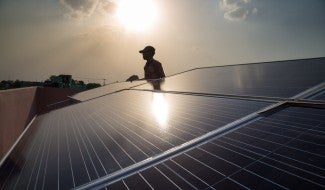As more people switch to clean energy alternatives, they’re creating more sustainable lifestyles and helping make our planet greener. If you’re considering joining this revolution, you can choose from a variety of renewable energy sources, such as biogas, hydroelectric, and wind. But the smartest choice is solar.
A solar rooftop system is one of the best ways to reduce your carbon footprint—and one of the most affordable, too. There’s an upfront investment required to install a system, but the operating costs are negligible and consuming your own solar energy can lead to substantial savings in the long run. Solar is also considered one of the safest and most reliable energy sources for modern homes and businesses.
What is a solar rooftop system?
Solar rooftop systems function like tiny power plants, creating their own electricity. Also called PV (photovoltaic) systems, they’re commonly mounted on top of commercial or residential structures. The systems generate electricity from PV panels that capture energy from the sun’s radiation and convert it into power.
System components include:
-
Mounting equipment
-
Solar inverters
-
Cables
-
Photovoltaic modules
-
Other electrical accessories
Generally, rooftop solar systems on residential buildings have a capacity of approximately 5-20 kW. For commercial purposes, capacity may be extended to 100 kW and beyond.
Rooftop Solar Systems: What are they, and how much money can they save for households?
Six key things to know about solar rooftop systems
Before installing a solar rooftop system, you can ensure optimal performance by considering:
1) House location and roof inclination
For your system to perform at its best, make sure it will receive enough sun. Solar energy generation works best in areas with comprehensive sunlight coverage. Locations receiving minimal sunlight are not able to generate optimal solar energy.
2) How much energy your home or property needs
Each household has its own energy consumption patterns and needs, so each requires a unique solar PV system. Although you can always add more solar capacity as energy consumption increases, it’s good to understand your current consumption patterns and needs before installing. With this knowledge, you can also decide whether to opt for an on-grid or off-grid system.
Calculate your energy consumption here.
3) The installer’s reputation
It’s important to thoroughly consider various solar installation companies before committing to one. You should look for an installation company that offers a robust product and superior services. Companies providing higher-quality equipment offer long-tenure warranties as well as regular maintenance and servicing.
4) System durability
Durability plays a crucial role in determining a solar energy system’s longevity and long-term performance. You can expect a quality system to run for as long as 25 years. You may spend more initially, but it makes sense to invest in a system you know will last.
5) Estimated installation time
Installation can take anywhere from days to months, depending on the needs of your household or business. Higher power requirements involve mounting more complex equipment, which can take more time, while lower power often means faster installation. You can help speed the process by choosing an established installer and brand. Experience and deep knowledge can help reduce operational costs—a win-win for solar customers.
6) Local regulations
Before installing your rooftop solar system, make sure you’ve obtained the required permissions and followed all applicable guidelines from local regulatory bodies. In most Indian states, the sanctioned load must be higher than the rooftop solar system, and the transformer’s capacity must accommodate the system. Usually, a solar panel installer takes care of the net metering application and agreement, which are relatively straightforward.
Government subsidies for solar panels in India
Government incentives, such as reduced taxes, have encouraged more people to switch to greener and safer energy sources, and the demand for clean energy has spurred technological innovations. These factors have lowered solar system prices for consumers over the past few years. At present, the estimated cost of solar panel installation ranges from ₹70000 to a few lakhs, depending on quality and size.
The Ministry of New and Renewable Energy (MNRE) has introduced several Central Financial Assistance (CFA) schemes. By encouraging the use of solar power, the government hopes to reach its target of 100 GW of electricity produced through solar.
To get the best savings on your system, make sure you ask your installer about the latest subsidies. Financial assistance from the central and state governments varies, and policies can change.
How to choose the right solar rooftop panel installer
Before selecting a solar PV system installer, enquire about:
-
A home visit
A good solar company will send an expert installer to your home to understand your needs and assess the best location for installing the panels. -
The installer’s background
Check their:-
Credentials and expertise in solar projects, as well as the number of rooftop installations they’ve completed.
-
Customer reviews and testimonials.
-
Warranties and maintenance programs. Several existing companies provide warranties of 25 to 30 years for solar panels and 10 to 25 years for inverters, based on their capacity and type.
-
The Enphase Energy System is one of the industry's best-performing clean energy systems, both in India and globally. We provide a 10-year limited warranty on IQ Microinverters, which you can extend up to 25 years.
Planning to install a rooftop solar system on your home?


